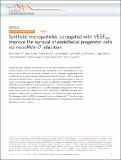| dc.contributor.author | Zoldan, Janet | |
| dc.contributor.author | Besnier, Marie | |
| dc.contributor.author | Carreto, Laura | |
| dc.contributor.author | Saif, Jaimy | |
| dc.contributor.author | Fernandes, Rui | |
| dc.contributor.author | Santos, Tiago | |
| dc.contributor.author | Bernardino, Liliana | |
| dc.contributor.author | Emanueli, Costanza | |
| dc.contributor.author | Ferreira, Lino | |
| dc.contributor.author | Aday, Sezin | |
| dc.contributor.author | Langer, Robert S | |
| dc.date.accessioned | 2018-05-03T17:36:05Z | |
| dc.date.available | 2018-05-03T17:36:05Z | |
| dc.date.issued | 2017-09 | |
| dc.date.submitted | 2016-11 | |
| dc.identifier.issn | 2041-1723 | |
| dc.identifier.uri | http://hdl.handle.net/1721.1/115214 | |
| dc.description.abstract | Several cell-based therapies are under pre-clinical and clinical evaluation for the treatment of ischemic diseases. Poor survival and vascular engraftment rates of transplanted cells force them to work mainly via time-limited paracrine actions. Although several approaches, including the use of soluble vascular endothelial growth factor (sVEGF) - VEGF 165 , have been developed in the last 10 years to enhance cell survival, they showed limited efficacy. Here, we report a pro-survival approach based on VEGF-immobilized microparticles (VEGF-MPs). VEGF-MPs prolong VEGFR-2 and Akt phosphorylation in cord blood-derived late outgrowth endothelial progenitor cells (OEPCs). In vivo, OEPC aggregates containing VEGF-MPs show higher survival than those treated with sVEGF. Additionally, VEGF-MPs decrease miR-17 expression in OEPCs, thus increasing the expression of its target genes CDKN1A and ZNF652. The therapeutic effect of OEPCs is improved in vivo by inhibiting miR-17. Overall, our data show an experimental approach to improve therapeutic efficacy of proangiogenic cells for the treatment of ischemic diseases. | en_US |
| dc.publisher | Nature Publishing Group | en_US |
| dc.relation.isversionof | http://dx.doi.org/10.1038/S41467-017-00746-7 | en_US |
| dc.rights | Attribution 4.0 International (CC BY 4.0) | en_US |
| dc.rights.uri | https://creativecommons.org/licenses/by/4.0/ | en_US |
| dc.source | Nature Communications | en_US |
| dc.title | Synthetic microparticles conjugated with VEGF165 improve the survival of endothelial progenitor cells via microRNA-17 inhibition | en_US |
| dc.type | Article | en_US |
| dc.identifier.citation | Aday, Sezin et al. “Synthetic Microparticles Conjugated with VEGF165 Improve the Survival of Endothelial Progenitor Cells via microRNA-17 Inhibition.” Nature Communications 8, 1 (September 2017): 747 © 2017 The Author(s) | en_US |
| dc.contributor.department | Massachusetts Institute of Technology. Department of Chemical Engineering | en_US |
| dc.contributor.mitauthor | Aday, Sezin | |
| dc.contributor.mitauthor | Langer, Robert S | |
| dc.relation.journal | Nature Communications | en_US |
| dc.eprint.version | Final published version | en_US |
| dc.type.uri | http://purl.org/eprint/type/JournalArticle | en_US |
| eprint.status | http://purl.org/eprint/status/PeerReviewed | en_US |
| dc.date.updated | 2018-04-27T15:26:40Z | |
| dspace.orderedauthors | Aday, Sezin; Zoldan, Janet; Besnier, Marie; Carreto, Laura; Saif, Jaimy; Fernandes, Rui; Santos, Tiago; Bernardino, Liliana; Langer, Robert; Emanueli, Costanza; Ferreira, Lino | en_US |
| dspace.embargo.terms | N | en_US |
| dc.identifier.orcid | https://orcid.org/0000-0003-4396-7812 | |
| dc.identifier.orcid | https://orcid.org/0000-0003-4255-0492 | |
| mit.license | PUBLISHER_CC | en_US |
